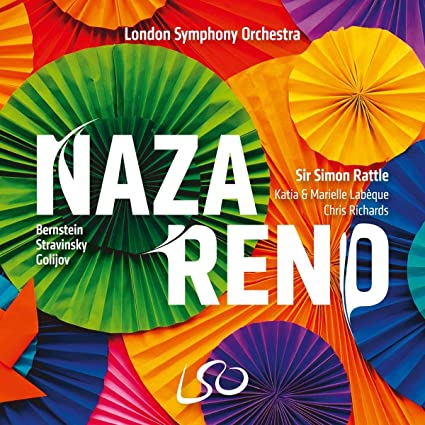

Leonard Bernstein: Prelude, Fugue and Riffs Igor Stravinsky: Ebony Concerto Osvaldo Golijov: Nazareno
The three pieces on offer on this new recording all share something in common. They generally require pinpoint ensemble precision, but also need to be played with reckless abandon. In other words, some parts need to be rhythmically straight as a pin, while other passages need to swing like a barn door during a tornado. Take for example the Prelude, Fugue and Riffs by Leonard Bernstein (1918-1990). It seamlessly combines classical form and structure with swing band jazz. It was dedicated to legendary jazz clarinetist Benny Goodman, and I don't remember ever hearing anything else in music that quite conjures up 1950s big city America quite like this does, from the hustle and bustle of vintage automobiles cruising down the skyscraper lined avenues to the seedy strip clubs. The Fugue segment demands utmost rhythmic discipline while the Riffs segment combines this accuracy with a sense of debauched laissez-aller. Clarinetist Chris Richards really gets into the swing of things here and Martin France on the drum kit actually sounds like a jazz combo drummer. The excellent audio engineering here clearly captures every sax grunt, clarinet peep and cymbal snap throughout the whole work. Until I read the booklet notes I wasn't aware that Bernstein had instructed that it was up to the performers themselves to decide when the piece should actually stop. When it's as foot-stomping good as it is in this performance, I wish it could go on forever.
Written in 1945 while living in Hollywood, the Ebony Concerto by Igor Stravinsky (1882-1971) is a bit more restrained in its delivery. I always thought that its title had to do with the type of wood used for clarinets and oboes, but the booklet notes point out that it relates to the African roots of jazz. The first movement, with its irregular and cross-rhythms demands utmost timing precision from each and every musician. Its unique combination of woodwind and brass instruments creates quite an interesting soundscape. The second movement evokes the kind of music you would hear during a New Orleans funeral procession, while the final picks up the pace a little and ends with perfectly matched instrument combinations that generate pure, harmonically precise and yet beautiful chords.
With its combination of two pianos played here by Katia and Marielle Labèque, Latin percussion provided by Gonzalo Grau and Raphaël Séguinier, and symphony orchestra, the polyrhythmic Nazareno by Argentinian composer Osvaldo Golijov (b. 1960) is another work that requires precise coordination from all parties, this time around with a touch of minimalism and a dash of mambo dance elements. It's an odd piece, actually arranged in 2009 for this instrumental grouping by Gonzalo Grau, based on Golijov's 2000 Passion According to St Mark. The title refers to the place of Jesus' childhood home, 'Nazarene', with each of its movements based on some from the Passion. I've never liked minimalism in general, but this time around with its inclusion of South American percussion instruments and Latin dance rhythms, it does in fact generate an engaging soundscape. Plaudits to the Labèque sisters for providing most of the music's backbone, and doing so with so much energy and enthusiasm. If its final movement doesn't make you want to get up and dance, you should go see your doctor.
The London Symphony Orchestra plays in a highly loosey-goosey fashion here as required, but again with a powerful punch and precise bite when called for. Many years ago back when EMI (now Warner Music) was a major player in classical music, Simon Rattle released this Jazz Album which included the Bernstein, to strong critical acclaim. He allows the music to sound as if in a late-night jazz club, which really pays off well, especially within the Prelude, Fugue and Riffs.
Jean-Yves Duperron - May 2022